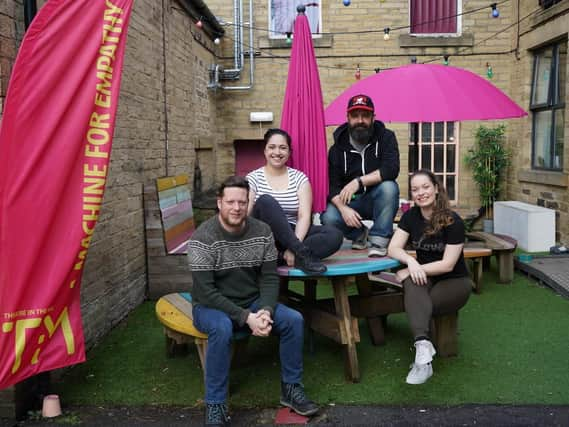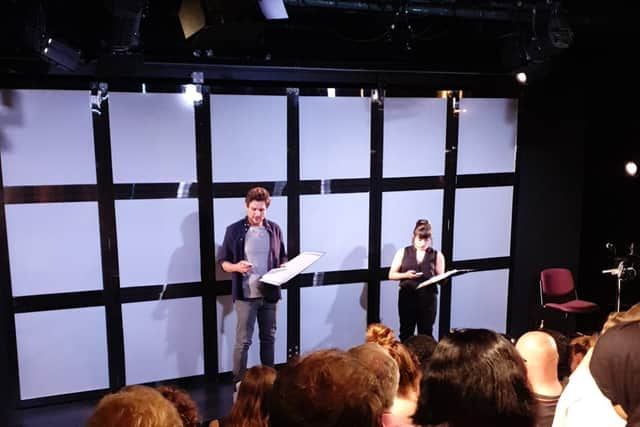Why Bradford's Theatre in the Mill is a hotbed of avant-garde work


A hole in the ground replaced with a gleaming edifice to consumerism at one end and a public square bringing citizens together to dance in the fountains at the other. They are two manifestations of a new confidence you’ll find in the city, but there are those who have always walked with the Bradford swagger.
Theatre in the Mill is where I end up this week on my virtual theatre journey, a place you’ll have read about in these pages because I’ve made it my mission to occasionally take you off the theatrically well-trodden paths.
Advertisement
Hide AdAdvertisement
Hide AdBased inside the University of Bradford campus, it’s impossible to overstate how this is more than a ‘university theatre’ (nothing wrong with that, of course). In fact, if you go, you’ll get to see some of the most avant garde work happening in the region at Theatre in the Mill.


Led by Iain Bloomfield for over a decade, during which time it established its experimental credentials, Richard Warburton took over as artistic director three years ago, bringing with him even more radical ideas.
“We are an artist-focused organisation. We employ the majority of our resources, time and thinking towards supporting artists to be creative, to be able to explore an idea, interrogate the world and abstract it in ways that resonate with audiences. What this means in practice is an offer to artists of money, physical space, advice, technical support, advocacy, networks, presentations of work, friendship, the freedom to play and learn without the need to always produce,” he says.
What that means is if an artist creates a piece of work and it’s not quite ready, you won’t get to see it until it is. That might seem unfair to you as an audience, but it creates a fearlessness in the creatives which pays off in the long run. When you do get to see the work, it is overflowing with confidence.
Advertisement
Hide AdAdvertisement
Hide Ad“We try to curate generous conversations and sharings that help artists effectively iterate how their idea is transmitted and received,” says Warburton.
“As much as possible we bring our audiences along with us on that journey. We are a small team of four, and all of us care about everything we do as an organisation and share the shaping of how our offer is presented and articulated.”
Ivan Mack is the theatre’s arts and digital technician, Jyothi Giles the senior producer and Hélène Coelho the marketing co-ordinator. It is a dedicated and impressive team that are practiced in thinking differently.
“We’re called a ‘theatre’, but we work with all sorts of live performance forms. In the last year we have showcased dance, virtual reality, live art, stand up comedy, performance poetry, participatory installations, pop-up theatre, live filmmaking, cooking, club nights, photography, and more.
Advertisement
Hide AdAdvertisement
Hide Ad“We operate four spaces and we don’t believe it’s up to us to define what is art or culture, if you have an idea that fits our values then we always want to talk about it.”
It’s not a typical theatre, but I hope that, by this point, you’ll be thinking that you’ll give Theatre in the Mill a visit once it’s safe to do so.
“I had a deep affection for the organisation going into it,” says Warburton. “And I know I’m not the only one. Theatre in the Mill was where I started my professional journey 20 years ago, as a result I came into the job wanting to amplify the reasons behind its reputation: the values and human-centred processes by which we run.”
In the past couple of years you will have seen work by Pauline Mayers, Luca Rutherford, Leon Fleming, Javaad Alipoor, Ellie Harrison at the venue, names who will be familiar to those drawn to the more experimental work being made in the region.
Advertisement
Hide AdAdvertisement
Hide AdAnother radical thing the theatre is doing is not staging work as you would normally see it, but all together over the course of a weekend.
Warburton says: “About a year and half ago we transitioned into a Weekender model, basically micro festivals presented over a long weekend. It works for us and we love it. The last one was Right Queer, Right Now which we presented as part of our long-term collaboration with New Queers on the Block, an initiative by Marlborough Arts.”
I ask him, as I have asked all the artistic directors of all the theatres I have ‘visited’ during lockdown, why his theatre is important. “It’s a hard question to answer without seeming conceited but I’ll try. I think you have to travel a good number of miles in any direction to find an organisation that is fortunate to be able to operate like we do,” he says.
“Being in Bradford has been incredibly emboldening. I am surrounded by equally brilliant organisations, individuals and independent artists that bring their own vital expertise, insight and perspective to the city. We are a city that doesn’t have a large producing house dwarfing the skyline and that works in our favour I think, small ideas don’t wilt in the shade here.
Advertisement
Hide AdAdvertisement
Hide Ad“This city is set up to capitalise on where it is now culturally. I believe the city should be confident that we are extremely well positioned to strike out and be exemplars of how a city can operate as a cultural city, one that places art at the forefront of how it operates on all levels. I consider the aspiration to be Capital of Culture 2025 as a deserved honour that will reflect what is actually happening at ground level here.”
Editor’s note: first and foremost - and rarely have I written down these words with more sincerity - I hope this finds you well.
Almost certainly you are here because you value the quality and the integrity of the journalism produced by The Yorkshire Post’s journalists - almost all of which live alongside you in Yorkshire, spending the wages they earn with Yorkshire businesses - who last year took this title to the industry watchdog’s Most Trusted Newspaper in Britain accolade.
And that is why I must make an urgent request of you: as advertising revenue declines, your support becomes evermore crucial to the maintenance of the journalistic standards expected of The Yorkshire Post. If you can, safely, please buy a paper or take up a subscription. We want to continue to make you proud of Yorkshire’s National Newspaper but we are going to need your help.
Advertisement
Hide AdAdvertisement
Hide AdPostal subscription copies can be ordered by calling 0330 4030066 or by emailing [email protected]. Vouchers, to be exchanged at retail sales outlets - our newsagents need you, too - can be subscribed to by contacting subscriptions on 0330 1235950 or by visiting www.localsubsplus.co.uk where you should select The Yorkshire Post from the list of titles available.
If you want to help right now, download our tablet app from the App / Play Stores. Every contribution you make helps to provide this county with the best regional journalism in the country.
Sincerely. Thank you.
James Mitchinson
Editor